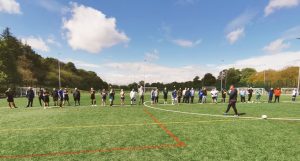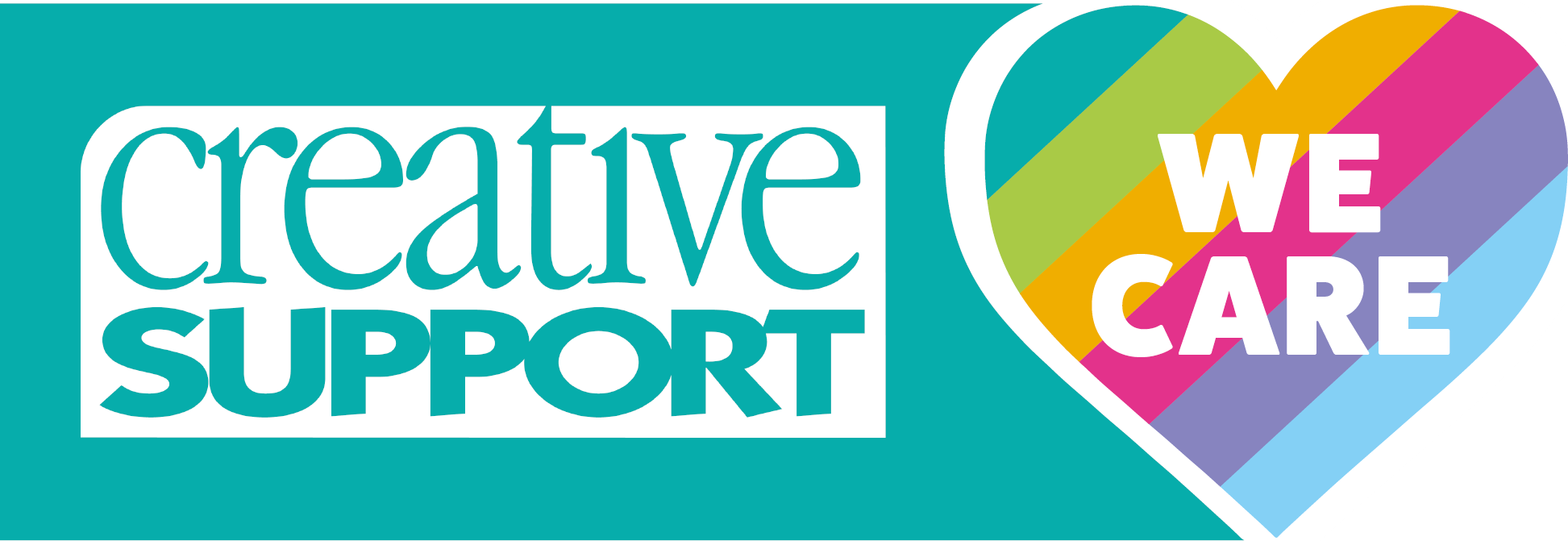Creative Football Interview

We spoke with Paul, founder of Creative Football, about the journey from kickabouts to a national league! He tells us more about what Creative Football is, how it helps people, and the benefits of keeping active and getting outside.
Can you tell me a bit about yourself and about Creative Football?
I started at Creative Support in January 2003 with a background in publishing. I experienced a close family member who became very unwell and I think more than anything I felt like the support wasn’t there for them. It was shocking to see them be stripped of their liberty in that way. I saw a job advertised for a Support Worker and was hired to work in an outreach service in Bolton.
After a couple of years doing this, I was seconded to Blackburn. When I work with people I like to try and find common ground which is usually music or football. There were a couple of lads at the service who loved football but hadn’t played since they were at school around 20 years ago and hadn’t been offered the opportunity to play since.
We set up a small football group and played for an hour a week. Over the next two years it got bigger and bigger as I made more contacts in Blackburn and Darwen and called up loads of services to see if people wanted to play. We had a great response and ended up setting up the Social Inclusion League. We started out originally as a ‘Mental Health League’ because of the service I was working in but this changed when we had more people from other services wanting to take part such as homelessness, supported living, substance misuse, and the asylum seeker and refugee communities and opened it up to everyone. Over the years we’ve attracted people all across the North West and beyond, which shows you that people didn’t have the opportunity to play beforehand.
When the league was running in around 2018, there were two lads that were playing for us. Wayne was playing for Kemple View Hospital and Paul was playing for the Creative Support team. Both lads became volunteers for the league and from that, they started talking about people who aren’t in services, or people who are working during the day and would prefer evening sessions. They ended up setting up Blokes United, which meets in Darwen and Langho on a Monday evening, Chorley on a Wednesday evening and Blackburn on a Thursday evening. We launch a Blokes United session in Burnley on Thursday 20th May.
Girls United is currently only in the day time but our focus is now on setting up an evening session so that working people and mums can come.
Can you tell me why Creative Football was started and its aims?
Creative Football is the umbrella for everything we do- it includes our daytime and evening sessions, the league, and Blokes and Girls United. It’s part of a national pilot scheme, and there are 12 areas in England that are part of it. Pennine Lancashire is one of these areas, and it’s based on all the work we did with the Social Inclusion League. Creative Football is actually funded by Sports England. It took three-and-a-half years to get to this point from the initial consultation of the pilot. Sports England attended one of our sessions and loved what we were doing!
Creative Football was formed when the Sport England funding came through as an umbrella term. Before this, when it was the ‘Social Inclusion League’, we were initially funded by Creative Support, then Awards for All, and finally the People’s Project (National Lottery). Blokes United was constituted in its own right and continues to be sponsored by Mike Hales of the Butler’s Arms.
Throughout the pandemic we were the only thing that really continued although we couldn’t do the group sessions. Through various means we were able to do one-on-one coaching and drills to keep people’s fitness up and had three different people on the hour every hour. In January during the second major lockdown we did walk and talks and as we have a fleet of bikes we also started hosting bike rides.
I think in the early days Creative Football was more about supporting people that wouldn’t normally access services or normally engage with services, so football was used as a more natural way of supporting someone. Mental health services can be intimidating and others hate going to see their care co-ordinator or their psychiatrists in a big grey building, and I fully understand why people don’t engage with it.
If you play football every week, you build a more natural and trusting relationship, and over time, you’ll find out what they’re struggling with. You also hear about all the environmental stress people are struggling with, such as benefits, dodgy landlords and all that, and that’s when you can help.
In the meantime, they’re getting exercise, making friends, and forming a new support network. We don’t ask for anything big when you sign up either, all you have to do is fill out your name and address, and any problems you might need to flag when you’re playing such as asthma. We don’t ask for any more details and it’s really informal. If problems arise or someone is struggling with something that we can’t resolve, then we work closely with all other organisations in the borough and can signpost or go with someone. We have personal contacts in AA, NA, CA and GA, and others, which helps cut out waiting times and referrals and they can get straight in there.
We have lots of players who are in recovery or have done their recovery and they’re putting their arms around people’s shoulders and lifting them up, kind of like sponsors. I think peer support is really underestimated. It also goes beyond the field too. One of our local pubs called the Butler’s Arms puts on loads of free food and drinks after sessions and everyone can come and have a great time together. It’s not just about the activity, it’s the before and after too.

Can you tell me about the benefits you’ve seen for people who take part in the league?
The league has such a wide range of services involved that it changes for each person. For instance, Kemple View Hospital, they bring a couple of teams each month and those lads get to know all the other players from all the other teams and all the staff from other organisations. When it’s time for them to be discharged from hospital, they already have this large support network and it helps them to feel a part of the community because they already have that support. If they need to be discharged or move into supported living, then because they know people, they have the option already available.
There are also lots of mental health benefits to playing to. Creative Football creates a community that breeds confidence and reassurance around moving on. Even when people leave services and maybe have a family or get a job, they keep coming back to play.
Obviously the physical benefits speak for themselves. It builds their fitness, helps them get outdoors, get that Vitamin D- it all makes you feel good. We always say that we benefit from Creative Football as much as anyone else and we love being out there with everyone. When you’re being physically active you sleep more naturally at night. It’s a nice tired, not sluggish. Some people want to start going to the gym because they want to be fitter or change their diets so that they can play even better so there are loads of knock on effects as well.
Would you encourage people to get outside and get active?
Oh definitely, I’d absolutely encourage people to try something out. If it’s something that we don’t offer but people ask, we can signpost and find someone who offers that activity. We can also go with them to their first session and help ease them into it.
During the pandemic, when we had to stop group sessions and instead turned to one-on-one sessions, we had quite a lot of new people coming down who wouldn’t have usually come to the group sessions because of anxiety. Because of this we’ve learned that when new people come down we’ll spend one-on-one time with them and do a little bit of coaching and ball work until they feel more confident joining in a session with 20 people. We always invite people down to Witton Park to have a chat and a brew before they even start. We all have anxiety, and we should always try and put ourselves in each other’s shoes. When I said earlier about opportunity, just think- you can’t walk up to a local football club and pay £5/£6 subs for a group that is already established as it’s daunting and hard with people at different skill levels. Because we’re so laid back here and it’s so informal, it’s about having fun and people get hooked immediately!
What’s next for Creative Football?
We’re re-launching the league on June 18th and we’ve already got 15 teams confirmed to play. They are from as far afield as North London, Glasgow, and Chesterfield. Because of our social media presence we’ve made quite a lot of friends over the years from all across the UK. Historically we’ve always taken teams across the country and made friendships that way. Obviously last year has been different and extremely difficult for everyone, so the relaunch of the league will have a festival feel with information stands, music and more.
You can keep up to date with everything Creative Football on our website creativefootball.co.uk or on our Twitter @PennineFootball and our Facebook Creative Football.
